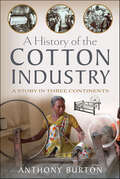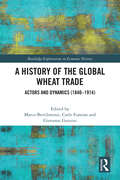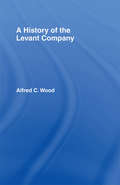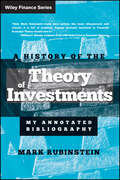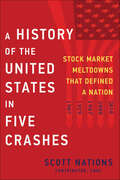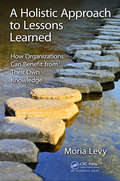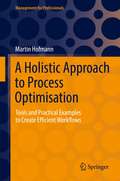- Table View
- List View
A History of the Book in America
by Michael Schudson Joan Shelley Rubin David Paul NordThe fifth volume of A History of the Book in America addresses the economic, social, and cultural shifts affecting print culture from World War II to the present. During this period factors such as the expansion of government, the growth of higher education, the climate of the Cold War, globalization, and the development of multimedia and digital technologies influenced the patterns of consolidation and diversification established earlier.The thirty-three contributors to the volume explore the evolution of the publishing industry and the business of bookselling. The histories of government publishing, law and policy, the periodical press, literary criticism, and reading--in settings such as schools, libraries, book clubs, self-help programs, and collectors' societies--receive imaginative scrutiny as well. The Enduring Book demonstrates that the corporate consolidations of the last half-century have left space for the independent publisher, that multiplicity continues to define American print culture, and that even in the digital age, the book endures.Contributors:David Abrahamson, Northwestern UniversityJames L. Baughman, University of Wisconsin-MadisonKenneth Cmiel (d. 2006)James Danky, University of Wisconsin-MadisonRobert DeMaria Jr., Vassar CollegeDonald A. Downs, University of Wisconsin-MadisonRobert W. Frase (d. 2003)Paul C. Gutjahr, Indiana UniversityDavid D. Hall, Harvard Divinity SchoolJohn B. Hench, American Antiquarian SocietyPatrick Henry, New York City College of TechnologyDan Lacy (d. 2001)Marshall Leaffer, Indiana UniversityBruce Lewenstein, Cornell UniversityElizabeth Long, Rice UniversityBeth Luey, Arizona State UniversityTom McCarthy, Beirut, LebanonLaura J. Miller, Brandeis UniversityPriscilla Coit Murphy, Chapel Hill, N.C.David Paul Nord, Indiana UniversityCarol Polsgrove, Indiana UniversityDavid Reinking, Clemson UniversityJane Rhodes, Macalester CollegeJohn V. Richardson Jr., University of California, Los AngelesJoan Shelley Rubin, University of RochesterMichael Schudson, University of California, San Diego, and Columbia UniversityLinda Scott, University of OxfordDan Simon, Seven Stories PressIlan Stavans, Amherst CollegeHarvey M. Teres, Syracuse UniversityJohn B. Thompson, University of CambridgeTrysh Travis, University of FloridaJonathan Zimmerman, New York University
A History of the Book in America
by Robert A. Gross Mary KelleyVolume Two of A History of the Book in America documents the development of a distinctive culture of print in the new American republic.Between 1790 and 1840 printing and publishing expanded, and literate publics provided a ready market for novels, almanacs, newspapers, tracts, and periodicals. Government, business, and reform drove the dissemination of print. Through laws and subsidies, state and federal authorities promoted an informed citizenry. Entrepreneurs responded to rising demand by investing in new technologies and altering the conduct of publishing. Voluntary societies launched libraries, lyceums, and schools, and relied on print to spread religion, redeem morals, and advance benevolent goals. Out of all this ferment emerged new and diverse communities of citizens linked together in a decentralized print culture where citizenship meant literacy and print meant power. Yet in a diverse and far-flung nation, regional differences persisted, and older forms of oral and handwritten communication offered alternatives to print. The early republic was a world of mixed media.Contributors: Elizabeth Barnes, College of William and MaryGeorgia B. Barnhill, American Antiquarian SocietyJohn L. Brooke, The Ohio State UniversityDona Brown, University of VermontRichard D. Brown, University of ConnecticutKenneth E. Carpenter, Harvard University LibrariesScott E. Casper, University of Nevada, RenoMary Kupiec Cayton, Miami UniversityJoanne Dobson, Brewster, New YorkJames N. Green, Library Company of PhiladelphiaDean Grodzins, Massachusetts Historical SocietyRobert A. Gross, University of ConnecticutGrey Gundaker, College of William and MaryLeon Jackson, University of South CarolinaRichard R. John, Columbia UniversityMary Kelley, University of MichiganJack Larkin, Clark UniversityDavid Leverenz, University of FloridaMeredith L. McGill, Rutgers UniversityCharles Monaghan, Charlottesville, VirginiaE. Jennifer Monaghan, Brooklyn College of The City University of New YorkGerald F. Moran, University of Michigan-DearbornKaren Nipps, Harvard UniversityDavid Paul Nord, Indiana UniversityBarry O'Connell, Amherst CollegeJeffrey L. Pasley, University of Missouri-ColumbiaWilliam S. Pretzer, Central Michigan UniversityA. Gregg Roeber, Pennsylvania State UniversityDavid S. Shields, University of South CarolinaAndie Tucher, Columbia UniversityMaris A. Vinovskis, University of MichiganSandra A. Zagarell, Oberlin College
A History of the Book in America, 5-volume Omnibus E-book
by David D. HallThe five volumes in A History of the Book in America offer a sweeping chronicle of our country's print production and culture from colonial times to the end of the twentieth century. This interdisciplinary, collaborative work of scholarship examines the book trades as they have developed and spread throughout the United States; provides a history of U.S. literary cultures; investigates the practice of reading and, more broadly, the uses of literacy; and links literary culture with larger themes in American history.Now available for the first time, this complete Omnibus ebook contains all 5 volumes of this landmark work.Volume 1The Colonial Book in the Atlantic WorldEdited by Hugh Amory and David D. Hall664 pp., 51 illus.Volume 2An Extensive Republic: Print, Culture, and Society in the New Nation, 1790-1840Edited by Robert A. Gross and Mary Kelley712 pp., 66 illus.Volume 3The Industrial Book, 1840-1880Edited by Scott E. Casper, Jeffrey D. Groves, Stephen W. Nissenbaum, and Michael Winship560 pp., 43 illus.Volume 4Print in Motion: The Expansion of Publishing and Reading in the United States, 1880-1940Edited by Carl F. Kaestle and Janice A. Radway688 pp., 74 illus.Volume 5The Enduring Book: Print Culture in Postwar AmericaEdited by David Paul Nord, Joan Shelley Rubin, and Michael Schudson632 pp., 95 illus.
A History of the Book in America- Volume 5
by Michael Winship Stephen W. Nissenbaum Jeffrey D. Groves Scott E. CasperVolume 3 of A History of the Book in America narrates the emergence of a national book trade in the nineteenth century, as changes in manufacturing, distribution, and publishing conditioned, and were conditioned by, the evolving practices of authors and readers. Chapters trace the ascent of the "industrial book--a manufactured product arising from the gradual adoption of new printing, binding, and illustration technologies and encompassing the profusion of nineteenth-century printed materials--which relied on nationwide networks of financing, transportation, and communication. In tandem with increasing educational opportunities and rising literacy rates, the industrial book encouraged new sites of reading; gave voice to diverse communities of interest through periodicals, broadsides, pamphlets, and other printed forms; and played a vital role in the development of American culture.Contributors:Susan Belasco, University of NebraskaCandy Gunther Brown, Indiana UniversityKenneth E. Carpenter, Newton Center, MassachusettsScott E. Casper, University of Nevada, RenoJeannine Marie DeLombard, University of TorontoAnn Fabian, Rutgers UniversityJeffrey D. Groves, Harvey Mudd CollegePaul C. Gutjahr, Indiana UniversityDavid D. Hall, Harvard Divinity SchoolDavid M. Henkin, University of California, BerkeleyBruce Laurie, University of Massachusetts, AmherstEric Lupfer, Humanities TexasMeredith L. McGill, Rutgers UniversityJohn Nerone, University of IllinoisStephen W. Nissenbaum, University of MassachusettsLloyd Pratt, Michigan State UniversityBarbara Sicherman, Trinity CollegeLouise Stevenson, Franklin & Marshall CollegeAmy M. Thomas, Montana State UniversityTamara Plakins Thornton, State University of New York, BuffaloSusan S. Williams, Ohio State UniversityMichael Winship, University of Texas at Austin
A History of the Chartered Accountants of Scotland: From the Earliest Times to 1954 (Routledge Library Editions: Accounting History #29)
by The Institute of Chartered Accountants of ScotlandThis book, first published in 1954, analyses the history of the world’s oldest accountancy body, the Institute of Chartered Accountants of Scotland. Chapters cover the history of Scottish accountants from the earliest times; review the position of the practicing accountant; assess the work of the Institute; examine the position of the accountant in commerce, industry or government service; and deal with the training and examination of accountants.
A History of the Cotton Industry: A Story in Three Continents
by Anthony BurtonThis book is about technology and how it has changed the lives of people on three continents over the last three hundred years. The development of the cotton industry was the starting point for one of the great turning points in history – the industrial revolution. It began with the importation of cloth into Britain from India and that created a new fashion. As the demand for cotton cloth grew, British inventors began to find ways of making the same cloth using powered machinery and built the first cotton mills. The old way of life of the textile workers was transformed, as work moved from home to factory and thousands of small children were brought in to tend the new machines. If conditions in the cotton towns were bad, they were far worse in America where, thanks to the work of slaves, the country took over the supply of raw material from India. During the American Civil War, Britain turned again to India for its supplies. Today, positions have changed dramatically. India again has a thriving industry, while in Britain only a fraction of the old mills are still at work. The author looks in detail at the technology that produced the changes, but the emphasis is very much on the human stories of the industrialists and their workers, the planters and their slaves in Britain, India and America.
A History of the Credit Market in Central Europe: The Middle Ages and Early Modern Period
by Pavla SlavíčkováThis is the first comprehensive study of loans and debts in Central European countries in the Middle Ages and Early Modern Period. It outlines the issues of debts and loans in the Czech lands, Poland and Hungary, with respect to the influence of Austria and Germany. It focuses on the role of loans and debts in medieval and early modern society, credit markets in these countries, the mechanism of lending and borrowing, forms of credit, availability of loans, frequency of credits dealings, range of lending business, and last, but not least, the financial relationships inside the social classes and between them. The research presented in the book is based on a wide range of resources including credit contracts and agreements, evidence of loans and debts of courts, accounting of nobility, towns, churches and guilds, merchant diaries and Jewish registers, as well as other financial records. It covers a wide range of historical disciplines including economic and financial history, social history, the history of economic thought as well as the history of everyday life. It also contains a wealth of case studies, which offer, for the first time in English, a comprehensive and representative sample of the most up-to-date Central European research on the history of loans and debts and serves as a basis for a comparison with the other parts of Europe during the same period. The book is designed primarily for postgraduates, researchers and academics in financial, economic and historical sciences but will also be a valuable resource for students of business schools.
A History of the Federal Reserve, Volume 1: 1913-1951
by Allan H. MeltzerAllan H. Meltzer's monumental history of the Federal Reserve System tells the story of one of America's most influential but least understood public institutions. This first volume covers the period from the Federal Reserve's founding in 1913 through the Treasury-Federal Reserve Accord of 1951, which marked the beginning of a larger and greatly changed institution.
A History of the Federal Reserve, Volume 2, Book 1: 1951-1969
by Allan H. MeltzerAllan H. Meltzer's critically acclaimed history of the Federal Reserve is the most ambitious, most intensive, and most revealing investigation of the subject ever conducted. Its first volume, published to widespread critical acclaim in 2003, spanned the period from the institution's founding in 1913 to the restoration of its independence in 1951. This two-part second volume of the history chronicles the evolution and development of this institution from the Treasury-Federal Reserve accord in 1951 to the mid-1980s, when the great inflation ended. It reveals the inner workings of the Fed during a period of rapid and extensive change. An epilogue discusses the role of the Fed in resolving our current economic crisis and the needed reforms of the financial system. In rich detail, drawing on the Federal Reserve's own documents, Meltzer traces the relation between its decisions and economic and monetary theory, its experience as an institution independent of politics, and its role in tempering inflation. He explains, for example, how the Federal Reserve's independence was often compromised by the active policy-making roles of Congress, the Treasury Department, different presidents, and even White House staff, who often pressured the bank to take a short-term view of its responsibilities. With an eye on the present, Meltzer also offers solutions for improving the Federal Reserve, arguing that as a regulator of financial firms and lender of last resort, it should focus more attention on incentives for reform, medium-term consequences, and rule-like behavior for mitigating financial crises. Less attention should be paid, he contends, to command and control of the markets and the noise of quarterly data. At a time when the United States finds itself in an unprecedented financial crisis, Meltzer's fascinating history will be the source of record for scholars and policy makers navigating an uncertain economic future.
A History of the Federal Reserve: 1913–1951
by Allan H. MeltzerAllan H. Meltzer's monumental history of the Federal Reserve System tells the story of one of America's most influential but least understood public institutions. This first volume covers the period from the Federal Reserve's founding in 1913 through the Treasury-Federal Reserve Accord of 1951, which marked the beginning of a larger and greatly changed institution. To understand why the Federal Reserve acted as it did at key points in its history, Meltzer draws on meeting minutes, correspondence, and other internal documents (many made public only during the 1970s) to trace the reasoning behind its policy decisions. He explains, for instance, why the Federal Reserve remained passive throughout most of the economic decline that led to the Great Depression, and how the Board's actions helped to produce the deep recession of 1937 and 1938. He also highlights the impact on the institution of individuals such as Benjamin Strong, governor of the Federal Reserve Bank of New York in the 1920s, who played a key role in the adoption of a more active monetary policy by the Federal Reserve. Meltzer also examines the influence the Federal Reserve has had on international affairs, from attempts to build a new international financial system in the 1920s to the Bretton Woods Agreement of 1944 that established the International Monetary Fund and the World Bank, and the failure of the London Economic Conference of 1933. Written by one of the world's leading economists, this magisterial biography of the Federal Reserve and the people who helped shape it will interest economists, central bankers, historians, political scientists, policymakers, and anyone seeking a deep understanding of the institution that controls America's purse strings. "It was 'an unprecedented orgy of extravagance, a mania for speculation, overextended business in nearly all lines and in every section of the country.' An Alan Greenspan rumination about the irrational exuberance of the late 1990s? Try the 1920 annual report of the board of governors of the Federal Reserve. . . . To understand why the Fed acted as it did—at these critical moments and many others—would require years of study, poring over letters, the minutes of meetings and internal Fed documents. Such a task would naturally deter most scholars of economic history but not, thank goodness, Allan Meltzer."—Wall Street Journal "A seminal work that anyone interested in the inner workings of the U. S. central bank should read. A work that scholars will mine for years to come."—John M. Berry, Washington Post "An exceptionally clear story about why, as the ideas that actually informed policy evolved, things sometimes went well and sometimes went badly. . . . One can only hope that we do not have to wait too long for the second installment."—David Laidler, Journal of Economic Literature "A thorough narrative history of a high order. Meltzer's analysis is persuasive and acute. His work will stand for a generation as the benchmark history of the world's most powerful economic institution. It is an impressive, even awe-inspiring achievement."—Sir Howard Davies, Times Higher Education Supplement
A History of the Federal Reserve: Book 1, 1951–1969
by Allan H. MeltzerThe second volume of “the definitive history of the central bank and monetary policy in the United States for the indefinite future” (Business History Review).Allan H. Meltzer’s critically acclaimed history of the Federal Reserve is the most ambitious, most intensive, and most revealing investigation of the subject ever conducted. Its first volume spanned the period from the institution’s founding in 1913 to the restoration of its independence in 1951. This two-part second volume of the history chronicles the evolution and development of this institution from the Treasury-Federal Reserve accord in 1951 to the mid-1980s, when the great inflation ended. It reveals the inner workings of the Fed during a period of rapid and extensive change.In rich detail, drawing on the Federal Reserve’s own documents, Meltzer traces the relation between its decisions and economic and monetary theory, its experience as an institution independent of politics, and its role in tempering inflation. He explains, for example, how the Federal Reserve’s independence was often compromised by the active policy-making roles of Congress, the Treasury Department, different presidents, and even White House staff, who often pressured the bank to take a short-term view of its responsibilities. With an eye on the present, Meltzer also offers solutions for improving the Federal Reserve, arguing that as a regulator of financial firms and lender of last resort, it should focus more attention on incentives for reform, medium-term consequences, and rule-like behavior for mitigating financial crises. Less attention should be paid, he contends, to command and control of the markets and the noise of quarterly data.Meltzer’s fascinating history will be the source of record for scholars and policy makers navigating an uncertain economic future.
A History of the Federal Reserve: Book 2, 1970–1986
by Allan H. MeltzerAllan H. Meltzer’s critically acclaimed history of the Federal Reserve is the most ambitious, most intensive, and most revealing investigation of the subject ever conducted. Its first volume, published to widespread critical acclaim in 2003, spanned the period from the institution’s founding in 1913 to the restoration of its independence in 1951. This two-part second volume of the history chronicles the evolution and development of this institution from the Treasury–Federal Reserve accord in 1951 to the mid-1980s, when the great inflation ended. It reveals the inner workings of the Fed during a period of rapid and extensive change. An epilogue discusses the role of the Fed in resolving our current economic crisis and the needed reforms of the financial system.In rich detail, drawing on the Federal Reserve’s own documents, Meltzer traces the relation between its decisions and economic and monetary theory, its experience as an institution independent of politics, and its role in tempering inflation. He explains, for example, how the Federal Reserve’s independence was often compromised by the active policy-making roles of Congress, the Treasury Department, different presidents, and even White House staff, who often pressured the bank to take a short-term view of its responsibilities. With an eye on the present, Meltzer also offers solutions for improving the Federal Reserve, arguing that as a regulator of financial firms and lender of last resort, it should focus more attention on incentives for reform, medium-term consequences, and rule-like behavior for mitigating financial crises. Less attention should be paid, he contends, to command and control of the markets and the noise of quarterly data.At a time when the United States finds itself in an unprecedented financial crisis, Meltzer’s fascinating history will be the source of record for scholars and policy makers navigating an uncertain economic future.
A History of the Global Economy
by Joerg BatenWhy are some parts of the world poor today, while others are rich? At which point in time did they diverge, and what were the reasons? These core questions are addressed in a concise and accessible introduction to global economic development since 1500. Leading economic historians from across the globe provide overviews of major world regions together with global comparison chapters and case studies highlighting key themes, individuals, processes and events. Utilising a set of common developmental indicators, the chapters address crucial issues such as how international trade and migration, institutions and flows of physical and human capital impacted economic growth. Richly illustrated with informative figures, maps, tables and charts, A History of the Global Economy summarises the key economic findings, debates and ideas, and provides students and the interested public with an up-to-date and engaging introduction to the origins and evolution of today's global economy.
A History of the Global Wheat Trade: Actors and Dynamics (1840-1914) (Routledge Explorations in Economic History)
by Marco Bertilorenzi Carlo Fumian Giovanni GozziniDuring the second half of the 19th century, a new global market for wheat came to the fore. Ever since, scarce and perishable food has been transformed into a modern global commodity, millions of tons of which is sold, bought, and transported across the oceans, providing the “daily bread” for a fast-growing world population.This book explores the historical origin of the global wheat market, offering an actor-centred view of the history of this new global commodity. The contributions to this volume demonstrate that the development of the global wheat trade through the late 19th and early 20th centuries has not only impacted the world food regime, it also led to the dissemination of new economic institutions. Countless technological innovations, such as elevators or telegraphic lines, have paved the way to the creation of new financial tools for trade, such as futures and grain exchanges, which transformed the market. The book also examines new global actors, such as Cargill, Louis-Dreyfus, or Bunge y Born, who took advantage of the new opportunities provided by the interlinked and globalized world grain trade. For the first time in history, the price of a single commodity which was crucial for human life ended up being decided in the areas of production by the producers and started to be fixed further afield, in specific and anonymous trading places.The book will be of great interest to historians of economics, business, trade, agriculture, globalization, and commodities.
A History of the International Movement of Journalists: Professionalism Versus Politics (Palgrave Studies in the History of the Media)
by Kaarle Nordenstreng Frank Beyersdorf Svennik H�yer Epp Lauk Ulf BjrkThis study presents a general history of how journalism as an emerging profession became internationally organized over the past one hundred and twenty years, seen mainly through the associations founded to promote the interests of journalists around the world.
A History of the Levant Company
by Alfred C. WoodFirst Published in 1964. Routledge is an imprint of Taylor & Francis, an informa company.
A History of the Marconi Company 1874-1965
by W. J. BakerThis accessible work provides a detailed picture of the history of one of the most important companies in the electronic industry.
A History of the Office and Office Work: From Castle to Condominium
by Rob HarrisThis book brings together the office and office working as an economic construct, as a business function, as a building type and as a mode of work. It explores social and economic relations, and it traces the evolution of work and the environment and equipment needed to support it over the last 400 years. In so doing, it helps to fill a void in popular understanding of the office.The role of the office has been examined over the past three years in ways that it has never been examined before. Whilst the existential crisis arising from COVID-19 has settled somewhat, there remain big questions over the future of office workers and office real estate. This book is a timely, well-researched and fascinating contribution to the debate.Rob Harris explores how the nature of work has changed, and continues to change, placing the events surrounding COVID-19 into a longer-term perspective and asking what is the future of the office? Will it go through a radical reinvention? How will office work evolve in the future? Whither office buildings? The book emphasises the continuum of change and that today’s events are simply the latest stage of change, rather than something entirely novel.This book will be of interest to anyone with a stake in the built environment, whether as an investor, occupier, owner, manager or advisor. It is equally accessible to those with a non-technical background, including students on courses such as economic history, economics, geography, real estate and urban planning.
A History of the Theory of Investments: My Annotated Bibliography (Wiley Finance #335)
by Mark Rubinstein"This exceptional book provides valuable insights into the evolution of financial economics from the perspective of a major player." -- Robert Litzenberger, Hopkinson Professor Emeritus of Investment Banking, Univ. of Pennsylvania; and retired partner, Goldman Sachs A History of the Theory of Investments is about ideas -- where they come from, how they evolve, and why they are instrumental in preparing the future for new ideas. Author Mark Rubinstein writes history by rewriting history. In unearthing long-forgotten books and journals, he corrects past oversights to assign credit where credit is due and assembles a remarkable history that is unquestionable in its accuracy and unprecedented in its power. Exploring key turning points in the development of investment theory, through the critical prism of award-winning investment theory and asset pricing expert Mark Rubinstein, this groundbreaking resource follows the chronological development of investment theory over centuries, exploring the inner workings of great theoretical breakthroughs while pointing out contributions made by often unsung contributors to some of investment's most influential ideas and models.
A History of the United States in Five Crashes: Stock Market Meltdowns That Defined a Nation
by Scott NationsIn this absorbing, smart, and accessible blend of economic and cultural history, Scott Nations, a longtime trader, financial engineer, and CNBC contributor, takes us on a journey through the five significant stock market crashes in the past century to reveal how they defined the United States todayThe Panic of 1907: When the Knickerbocker Trust Company failed, after a brazen attempt to manipulate the stock market led to a disastrous run on the banks, the Dow lost nearly half its value in weeks. Only billionaire J.P. Morgan was able to save the stock market.Black Tuesday (1929): As the newly created Federal Reserve System repeatedly adjusted interest rates in all the wrong ways, investment trusts, the darlings of that decade, became the catalyst that caused the bubble to burst, and the Dow fell dramatically, leading swiftly to the Great Depression.Black Monday (1987): When "portfolio insurance," a new tool meant to protect investments, instead led to increased losses, and corporate raiders drove stock prices above their real values, the Dow dropped an astonishing 22.6 percent in one day.The Great Recession (2008): As homeowners began defaulting on mortgages, investment portfolios that contained them collapsed, bringing the nation's largest banks, much of the economy, and the stock market down with them.The Flash Crash (2010): When one investment manager, using a runaway computer algorithm that was dangerously unstable and poorly understood, reacted to the economic turmoil in Greece, the stock market took an unprecedentedly sudden plunge, with the Dow shedding 998.5 points (roughly a trillion dollars in valuation) in just minutes.The stories behind the great crashes are filled with drama, human foibles, and heroic rescues. Taken together they tell the larger story of a nation reaching enormous heights of financial power while experiencing precipitous dips that alter and reset a market where millions of Americans invest their savings, and on which they depend for their futures. Scott Nations vividly shows how each of these major crashes played a role in America's political and cultural fabric, each providing painful lessons that have strengthened us and helped us to build the nation we know today.A History of the United States in Five Crashes clearly and compellingly illustrates the connections between these major financial collapses and examines the solid, clear-cut lessons they offer for preventing the next one.
A History of the Western Art Market: A Sourcebook of Writings on Artists, Dealers, and Markets
by Titia HulstThis is the first sourcebook to trace the emergence and evolution of art markets in the Western economy, framing them within the larger narrative of the ascendancy of capitalist markets. Selected writings from across academic disciplines present compelling evidence of art’s inherent commercial dimension and show how artists, dealers, and collectors have interacted over time, from the city-states of Quattrocento Italy to the high-stakes markets of postmillennial New York and Beijing. This approach casts a startling new light on the traditional concerns of art history and aesthetics, revealing much that is provocative, profound, and occasionally even comic. This volume’s unique historical perspective makes it appropriate for use in college courses and postgraduate and professional programs, as well as for professionals working in art-related environments such as museums, galleries, and auction houses.
A Holistic Approach to Lessons Learned: How Organizations Can Benefit from Their Own Knowledge
by Moria LevyThe book presents a holistic approach to organization performance improvements by lessons learned management. Such an approach is required because specific methods, such as debriefing, task management or procedures updates, do not achieve actual improvements. The presented model spans the entire life cycle of lessons learned: Starting from creating new lessons, moving on to knowledge refining and ending with smart integration into the organizational environment so future re-use of knowledge is enabled. The model also addresses other sources of organizational learning including quality processes and employee experience utilization.
A Holistic Approach to Process Optimisation: Tools and Practical Examples to Create Efficient Workflows (Management for Professionals)
by Martin HofmannThis book provides an overview of the various methods for creating and implementing efficient work processes. The author presents the most important tools for working on improvement projects such as process mapping, Ishikawa diagram, burn-down chart, or Pareto chart. Using successfully realized improvement projects from practice, the concrete implementation of process optimization is illustrated. In addition, it is shown how these methods, which originate from the production sector, can be successfully used in the office sector.
A Hospitable World?: Organising Work and Workers in Hotels and Tourist Resorts (Contemporary Geographies of Leisure, Tourism and Mobility)
by David Jordhus-Lier Anders UnderthunThe hospitality and tourism sector is a large and rapidly expanding industry worldwide, and can rightfully be described as a vehicle of globalisation. Hotels are among the cornerstones of the industry often drawing workers from the most vulnerable segments of multicultural labour markets, accommodating and entertaining tourists and business travelers from around the world. This book explores the organisation of work, worker identities and worker strategies in hotel workplaces, as they are located in heterogeneous labour markets being changed by processes of globalisation. It uses an explicitly geographical approach to understand how different groups of workers experience and respond to challenges in the hospitality industry, and is based on recent theoretical debates and empirical research on hotel workplaces in cities as different as Oslo, Goa, London, Las Vegas and Toronto. A multi-scalar analysis is taken where concrete worker bodies and their physical, emotional and embodied labour are seen in relation to, among other aspects: the regulation of national and regional labour markets, city governments with global city ambitions, and global corporate actors and labour migration patterns. The book sheds light on the hotel workplace as a hierarchical and fragmented social space as well as addressing questions on worker mobility, the fragmentation of work, scales of organisation and how workers can help shape the regulation of their industry. This timely volume brings together contributions from international academics and is valuable reading for all those interested in hospitality, tourism, human geography and globalisation.
A How To Guide For Medical Students (Success in Academic Surgery)
by Andrea Gillis Cary B. AaronsThis book will provide a guide for medical students to self-reflect, build a portfolio, and select a career path equipped with the knowledge to make an informed decision that is the best for them. The editors comprise a diverse spectrum from background, stage of training, type of practice, to career path. This is a timely update taking into account new situations such as the virtual environment for residency applications, the spotlight on residency wellness, and incorporating diversity, equity, and inclusion in our personal and institutional missions.





